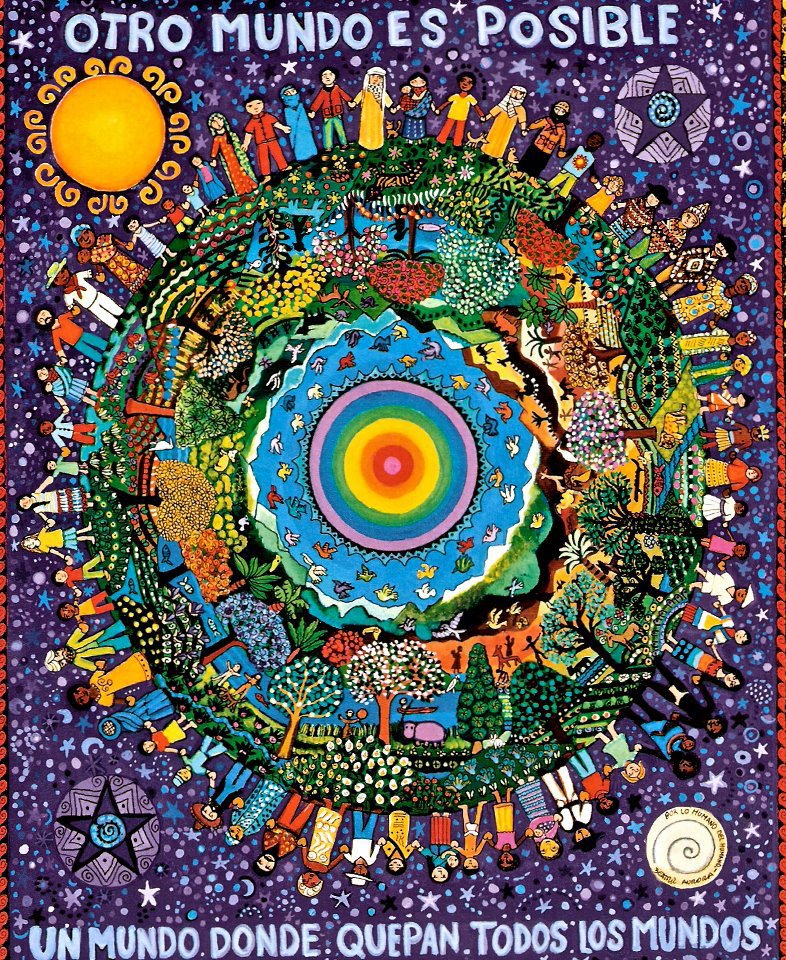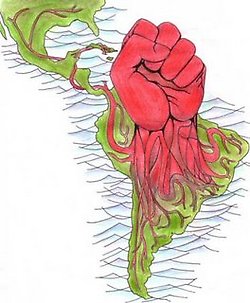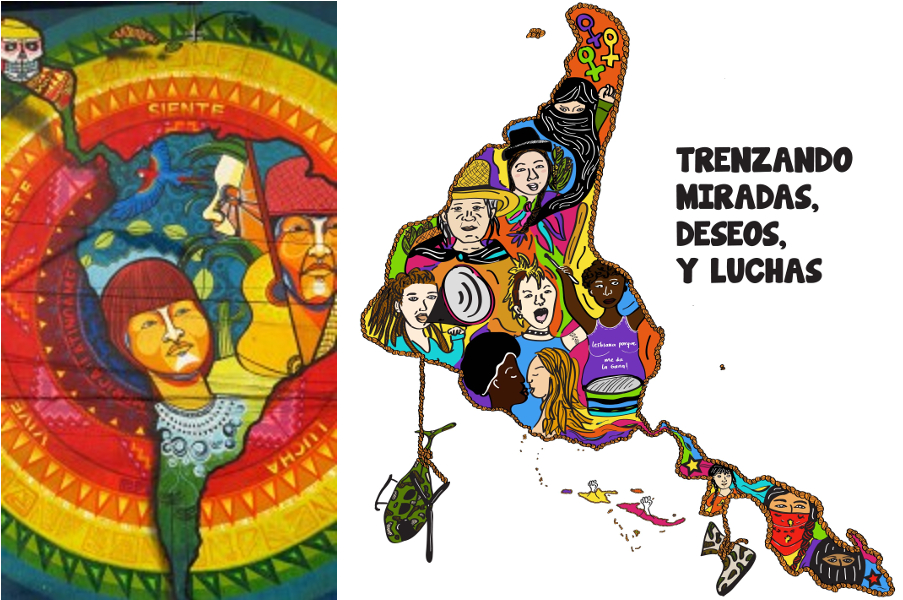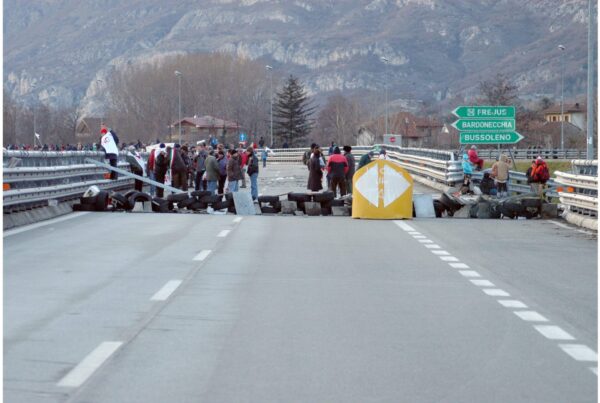By Ana Estefanía Carballo, Gibrán Cruz Martínez, and Émilie Dupuits
There exists a significant and valuable production of original thinking on political ecology and development in Latin America which remains largely confined to the region, due to linguistic barriers and ‘coloniality of knowledge’ . The Alternautas digital platform emerges from a desire to bridge such barriers, and to bring Latin American discourses, realities and social research into conversation with other world regions and non-academic spaces. This is an open invitation
Latin-American critical thinking: decolonizing Eurocentric Political Ecology
Political Ecology as a theoretical field took its inspiration from diverse intellectual genealogies. One main origin can be found in Western countries, for example, in the tradition of cultural geography in North America or critical geography in the UK. These fields have brought a political perspective on nature/society relations, breaking with the past apolitical approach of ecological studies.
However, various authors have tried to value the Latin American heritage and roots of political ecology beyond Eurocentrism. Latin American political ecology originates from critical thinking traditions in the region, based on major intellectual influences such as Karl Marx, José Carlos Mariátegui, Josué de Castro, and Eduardo Galeano. The Catholic Church has also considerably influenced critical thinking in Latin America, through the Theory of Liberation. This theory aimed to recognize the role of colonization in generating periphery/centre inequalities among Western and Southern countries, and link poverty, racism, gender discrimination and ecology.
One of the leading intellectuals in the development of Latin American Political Ecology was Hector Alimonda. Alimonda brought an important legacy in the debate of ideas around Modernity/Coloniality and the power relations at play in the social appropriation of nature. A central forum for these discussions in the region has been the Political Ecology Working Group of the Latin American Council of Social Sciences (CLACSO), co-founded by Alimonda, and now renamed the “Political Ecologies from the South/Abya-Yala Working Group”. When it was created, within CLACSO, one of its main tasks was to decolonize Eurocentric theory and to create a new place of enunciation from Abya Yala. (Abya Yala refers to the original name given to America before colonization by the indigenous peoples from Panama and Colombia.) In a special issue of the Ecología Política journal dedicated to Latin-American political ecology, Adela Parra-Romero discusses the need to decolonize knowledge production and the analysis of socio-environmental conflicts in the region. A central feature of these efforts can be seen in its anti-positivist approach and the participation of many intellectuals that remain at the margins of formal academic institutions. Thinking political ecology from the South implies, at times, entering into a critical conversation with central concepts of political ecology created in the North –see for example, Miriam Lang’s discussion of the suitability of degrowth for Latin America – but also with concepts emerging from the South and popularized in the North – see for example, Javier Cuestas-Caza’s discussion of the differences between Buen Vivir and Sumak Kawsay.
The Working Group also contributed to identify the specificities of the Latin American region, including the legacy of colonialism/imperialism, dependency and unequal exchange, recurrent environmental injustices and accumulation by dispossession processes. One related characteristic of Latin American political ecology is then that it is firmly rooted in environmental activism experiences throughout the continent resisting extractivism and neoliberal policies. Based on these movements emerged the concept of “environmentalism of the poor” that seeks to value the struggles of peasants, indigenous peoples, women and vulnerable groups for both environmental and social justice. Some Latin American political ecologists, such as Arturo Escobar or Enrique Leff, have questioned the epistemological framework in which political ecology discussions take place, recovering part of the Latin American indigenous and cultural heritage. Escobar, for example, prefers talking about political ontology rather than political ecology, and he calls for adopting a new approach “from below, toward the left and with the land”. Leff also reminds us that the environmental crisis is also a crisis of modes of knowledge. According to Maristella Svampa, an eco-territorial turn has taken place in Latin American critical thinking, one that has given Political Ecology as a discipline a unique strength. In its quest to understand the convoluted relations between humans and nature from a region marked by its dependence on natural resources, Latin American political ecology has become a central tool to understand its key political, social and economic trends.

“Otro Mundo es Posible”, by Beatriz Aurora, from her collection “Historias Pintadas: el color de la lucha zapatista”. The Zapatistas have been a source of inspiration for a political ecology of/from Abya Yala. Source: Araucanía
Alternautas: searching for Abya Yala
Alternautas is an online platform, blog, and journal created in 2013, and publishing content since 2014. Composed by early career academics from universities across the world, Alternautas seeks to represent the collective, independent, and critical effort of Latin Americanists to foster cross-cultural knowledge exchange in times of global social, political, cultural, economic and ecological crises. Alternautas sees these crises as related to the prevalence of the mainstream agendas of utilitarian, capitalist, and modernizing/colonial development. In Latin America, the predominance of modes of development based on the extraction of natural resources has brought, as we discussed, much of its critical thinking very close to these political ecology discussions. As such, our work in Alternautas has been widely rooted in the tradition of critical thinking and Latin-American political ecology. Every six months for the last five years, Alternautas has published open-access and peer-reviewed issues of the articles available on its website. Scholars have contributed to the political ecology scholarly literature in three special issues and a multiplicity of articles. The next lines will recollect some of these publications as an open invitation to engaging with the original articles.
The first special issue was devoted to understand the uses, policies and meanings of water in the Latin American context of extractivism. “Water and (neo)Extractivism in Latin America” includes seven articles with case-studies from Central and South America where the states justify the continuous exploitation and commodification of natural resources to finance social development programs. From a multidisciplinary perspective, the issue highlights the victories of the indigenous communities Munduruku over the Brazilian government preventing the building of a hydroelectric complex; how the neoliberal water management framework in Chile has concentrated water rights in extractive industries dispossessing small farmers from this precious resource; and the power dynamics and struggles involved in the reproduction of dominant structures for profit and power in the treatment of sewerage in Lake Atitlán in Guatemala.
Critics to (neo)extractivism and the region´s developmentalist path with large-scale agricultural producers and agribusinesses are the backbones of the second special issue, “Agribusiness, (Neo)Extractivism and Food Sovereignty: Latin America at a Crossroads?”. The eight articles in this issue explore some of the tensions and conflicts in the agricultural battlefield arising from the expansion of agribusiness as the dominant mode of accumulation and food production in Abya Yala. Articles propose alternatives to the dominant agricultural model such as the IALA “María Cano” agroecology school in Colombia, and the Embera-Chami communities’ networks of seed saving, multiplication, and reproduction in search of agricultural sovereignty. Others provide an ethnographic account of the consequences of the hegemonic role of soybean production in Argentina´s agribusiness model; and the possibility of transforming agronomic research into a “science for the people”. This special issue was translated in its entirety into Spanish.

The open veins of Latin America are also a source of resistance and re-existance. Author: N/A. Source: Culturasí
The most recent special issue examines the disaster conditions, responses and consequences of the 2017 Hurricane Season in the Caribbean, with particular attention to Puerto Rico Barbados, Dominica and Cuba. “The Making of Caribbean Not-so-Natural Disasters” includes six articles, a book review and a poem narrating how hurricanes are not strictly or exclusively natural disasters. Policy legacies of western powers’ occupations, soaring levels of inequality, unequal status and commodification are some of the structural factors amplifying, behind the scenes, the effects of disasters. One article explores the narratives and experiences of communities without access to the public water system in post-Hurricane María and the alternative water sources used in the rural areas in Puerto Rico. Other articles uncover the historical role played by plantation agriculture in enhancing hurricane vulnerability in the British Caribbean; and reflect on the lessons that could be extracted from a series of successful strategies in Cuba around hurricane preparedness and trust networks.
Other contributions in Alternautas have included key translations of Latin American political ecology intellectuals. These include, for example, works by Eduardo Gudynas, Maristella Svampa, Anibal Quijano, Enrique Leff, Silvia Rivera Cusicanqui and Alberto Acosta, among others. More recently, Alternautas published a mini-dossier of three articles in tribute to the work of Hector Alimonda. Facundo Martín, Gabriela Merlinsky and Catalina Toro Pérez start the dossier presenting Alimonda’s unique contribution to the field of political ecology in Latin America. The second piece is the translation of the introduction of Alimonda’s latest edited book, Ecología Política Latinoamericana, and the third piece is a translation of “The coloniality of nature”, an article that appeared originally in La naturaleza colonizada.
We believe that there exists a significant and valuable production of relevant and original thinking about political ecology and development in Latin America. However, it remains largely regionally confined due to linguistic barriers and the broader ‘coloniality of knowledge’ (colonialidad del saber). Alternautas emerges from a desire to bridge such barriers, and bring Latin American discourses, realities and social research (both from, and on Latin America) into conversation with other world regions and non-academic spaces. The invitation is open.
Featured Image (top): Logo for the 10th Abya Yala’s Lesbian Feminist Gathering, by Ana Carvajal. Source: Yala: Arte i Resistencia
—
Ana Estefanía Carballo is a Research Fellow in Mining and Society at the University of Melbourne. Her research interests focus on the interplay between indigenous epistemologies, human and environmental development ethics and social movements and environmental conflicts in Latin America.
Gibrán Cruz Martínez is a Juan de la Cierva Research Fellow at the Institute of Public Goods and Policies (CSIC, Spain). His research interests include alternative actors in welfare production in marginalised communities, and political and economic viability of universal social protection in low- and middle-income countries.
Émilie Dupuits holds a PhD in political science from the University of Geneva, Switzerland. She is now working on a postdoctoral project funded by the Swiss National Foundation (FNS) on water commons, grassroots movements and techno-social imaginaries in Imbabura, Ecuador.






